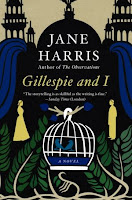 Jane Harris is the author of the award-winning novel The Observations and, more recently, Gillespie and I.
Jane Harris is the author of the award-winning novel The Observations and, more recently, Gillespie and I.For the Wall Street Journal, she named a five best list of "tales that invite the reader to puzzle over complex characters," including:
Pale FireRead about another book on the list.
by Vladimir Nabokov (1962)
'A Jack-in-the-box, a Fabergé gem, a clockwork toy, a chess problem ... an infernal machine ... a cat-and-mouse game." Thus, upon its publication in 1962, one critic described this extraordinary novel. "Pale Fire" is all this and more: both a satire and a mystery; a daunting intellectual challenge but one that has many rewards forNabokov fans, not least the satisfaction of his gorgeous prose and the way that this book turns us all into detectives. The novel presents a long poem by recently murdered American poet John Shade, with a commentary written by Shade's friend Charles Kinbote, an academic from a country named Zembla. Kinbote claims to have been entrusted with preparing the dead poet's manuscript for publication. But how reliable a narrator is he? Shade's poem reads like elegiac autobiography, yet Kinbote apparently believes it to be an allegorical work about his own country. As the reader shifts between poem and commentary, trying to solve the puzzle of this novel, other possibilities present themselves until we aren't sure who Kinbote might be or who, indeed, has even written this magnificent and melancholic text.
Pale Fire's John Shade is among John Mullan's ten best fictional poets. The novel appears on Edward Docx's top ten list of deranged characters. It is one of Tracy Kidder's six best books as well as the novel Charles Storch would save for last. It is one of "Six Memorable Books About Writers Writing" yet it disappointed Ha Jin upon rereading.
--Marshal Zeringue





